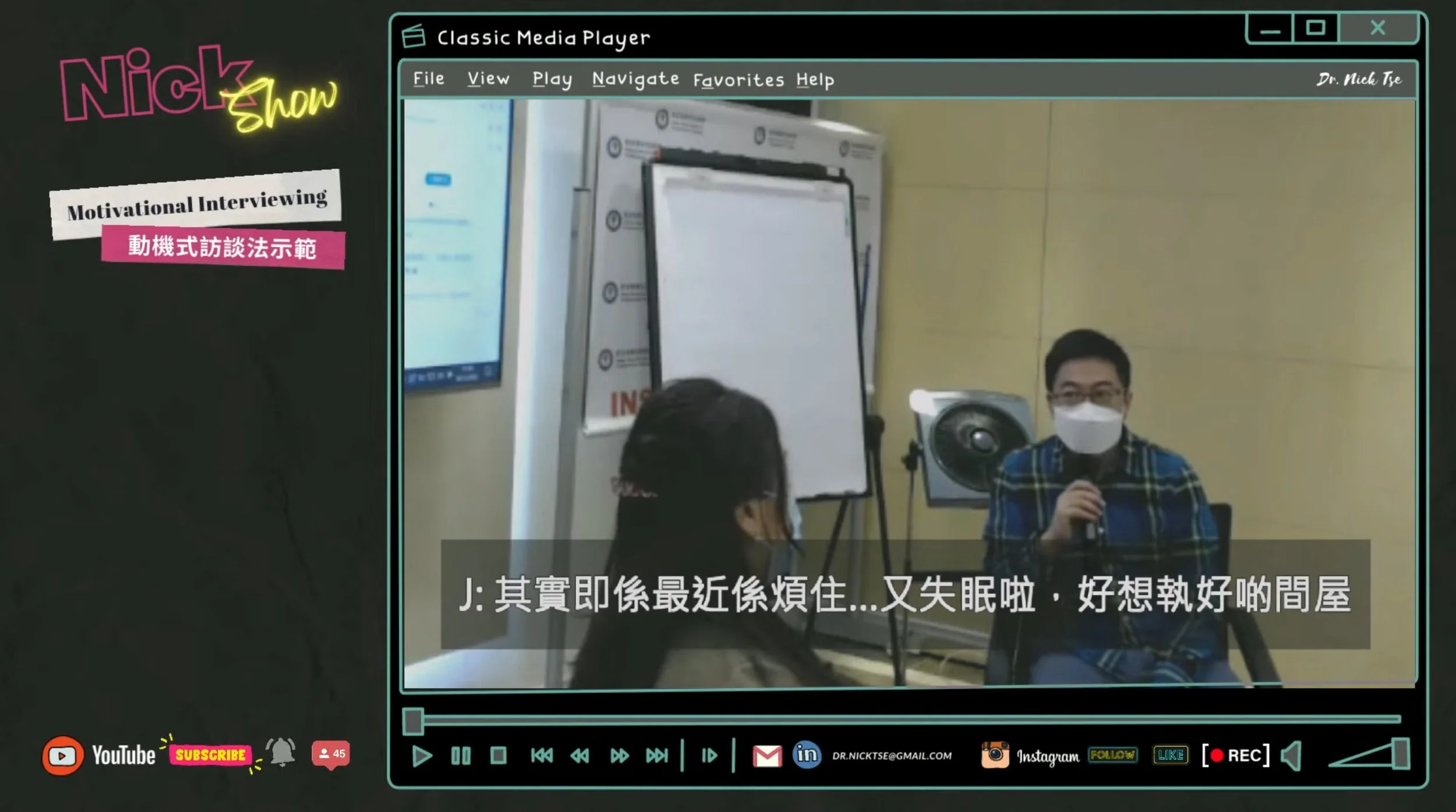Brief Introduction to Motivational Interviewing
Author:Nick Tse, P.hD. (謝家和博士 )
First MINT Certified MI trainer and rater for the certification scheme in Hong Kong
Date:February 7, 2022
Citation:
Tse, N, (2022, February 7) Brief introduction to Motivational Interviewing. www.nicktse.net/
Origin of Motivational Interviewing
Motivational interviewing was developed by American Psychology and Psychiatry Professor Miller and British Psychologist Rollnick. It can be traced back to Miller, W. R. (1983). Motivational interviewing with problem drinkers. Behavioural and Cognitive Psychotherapy, 11(2), 147-172. This article has become a hallmark of literature discussing the intervention principle and conceptual foundation for motivational interviewing. If you are interested enough in the deep ancestry, please don’t miss reading this original work.
Miller’s early career worked in an alcoholism treatment center. At that point, the mainstream public generally espouses moral judgments against addicts from a moral and ethical perspective (moral model), viewing them as degenerates. Marginalizing drug addicts resulted in a society that discouraged them from seeking help. Therefore, the alcoholism treatment facility where Miller was working embraced Carl Rogers’ “person-centred therapy”, otherwise known as the “non-directive approach”. This approach focuses on the client’s personal growth and positive development. Here, the therapist is required to demonstrate “congruence”, “unconditional positive regard”, and “empathy”. Miller absorbed nutrients of “person-centred”, integrated the practical wisdom and experience of dealing with resistance and ambivalence, and finally developed “Motivational Interviewing”.
Definition of Motivational Interviewing
Motivational interviewing (MI) is a collaborative, goal-oriented approach to therapy. MI is a style of counseling that aims to help people change their behaviors. It takes a non-confrontational approach, focusing on exploring and resolving the client's ambivalence about change. The guiding process avoids judgment and conflict with clients, but creates an atmosphere of acceptance and compassion to help people explore and evoke the reasons for change, and strengthen one’s motivation and commitment to change (Miller & Rollnick, 2013).
Spirit of Motivational Interviewing
Partnership(合作)
Motivational interviews emphasize the collaborative relationship between counselor and client. "Partnership" is a result of counselors putting the client's goals front and center and maintaining an equal dialogue between the parties involved in the counseling, setting aside professional guidance and opinion, giving less authoritarian and more open channels to let their feelings and thoughts speak for themselves. Counselors must avoid persuading, while getting to the heart of their clients. Counselors strive to make their clients comfortable and accept their opinions and behaviors. Still, counselors will fight for and respect their clients' opinions and behaviors in the process, and open up space for them to express their thoughts and feelings. Hence, the clients have more freedom and security to express themselves. The counselor has a deeper understanding of the client, which aids the counselor to achieve a more trusting relationship.
接納(Acceptance)
動機式訪談中所提倡的接納包括四個元素:
(─) ,絕對價值 (你相信案主的能力和潛能改變嗎?)
(二) ,自主 (你願意和案主分享權力,讓案主的自決能力得到彰顯嗎?)
(三) ,準確同感 (你願意在案主的角度看事物嗎?感受到他們的感受嗎?)
(四) ,肯定 (你對案主表示有心無力,你會給案主肯定嗎?如何做到?)
這四大元素所組成的「接納」能建構出一個讓案主感到安全、舒適、非批判和不帶侵略性的溝通環境。
喚出(Evocation)
輔導員相信案主本身已擁有改變所需要的元素,關鍵在於如何喚出案主的改變動力。我們只要導引案主進入共同探索的過程,讓案主發掘出自身有行改變的觀點和動力。輔導員就像一塊鏡子,透過反映給案主,讓案主更了解自己擁有的資源、經驗和能力,以助案主邁向改善。
至誠為人(Compassion)
在動機式訪談的過程中,輔導員需要積極地把案主的需要和福祉作為優先考慮的要素。或許你是戒毒輔導中心的輔導員,目標是協助案主戒毒;或許你是老師,目標是幫助學生考取好成績;或許你是護士,希望病人可以依循醫生的指示服藥,好好控制糖尿和血壓指數。這些都是我們作為助人專業者的良好意願。但我們必需要緊記,案主需要一個怎樣的助人者呢?讓案主/學生/病人了解到,我們總是會從他們的角度和福祉出發,讓他們多一份安心和被重視。
動機式訪談的四步介入過程 (Four-process model)
(歡迎運用此圖片,請註明出處 www.nicktse.net )
導進 (Engaging) 是建立一個互相信任和尊重的有利關係的過程。輔導員專注懷著好奇心,了解案主的想法和需要。
聚焦 (Focusing) 是協助案主釐清個人的想法,以制定具共識的面談方向。輔導員和案主也會參與在制定面談方向的過程,讓整個過程得到均衡參與,體現合作性和協作。
喚出 (Evoking) 是協助案主找出內藏著的改變動機。輔導員會運用開放式喚出問句(Evocative questions) ,來引出案主的改變語句 (Change Talk) ,並運用不同的手法和對應策略(例如:建立價值和目標差異) ,探究案主改變的原因和需要。
計劃 (Planning) 當案主表示已準備好作出改變,並在對談中明確表示作出改變。輔導員在了解案主的需要和進度,看看是否需要和案主一同建立改變的行動計劃。
參考文獻:
Miller, W. R. (1983). Motivational interviewing with problem drinkers. Behavioural and Cognitive Psychotherapy, 11(2), 147-172.
Miller, W. R., & Rollnick, S. (2013). Motivational interviewing: Helping people change. Guilford press.
動機式訪談法 謝家和博士 廣東話示範 (目標:執屋)│社工│輔導員│成癮及精神健康研究員│Motivational
我第一次Post 動機式訪談法示範片段,歡迎大家留言,分析,分享,討論。如果大家想睇另一段,我如何分析這示範的質素,同埋用左咩技巧。請大家Like, share, subscribe。你地既comment係我繼續出片既動力。
更新日期:2022年2月7日


